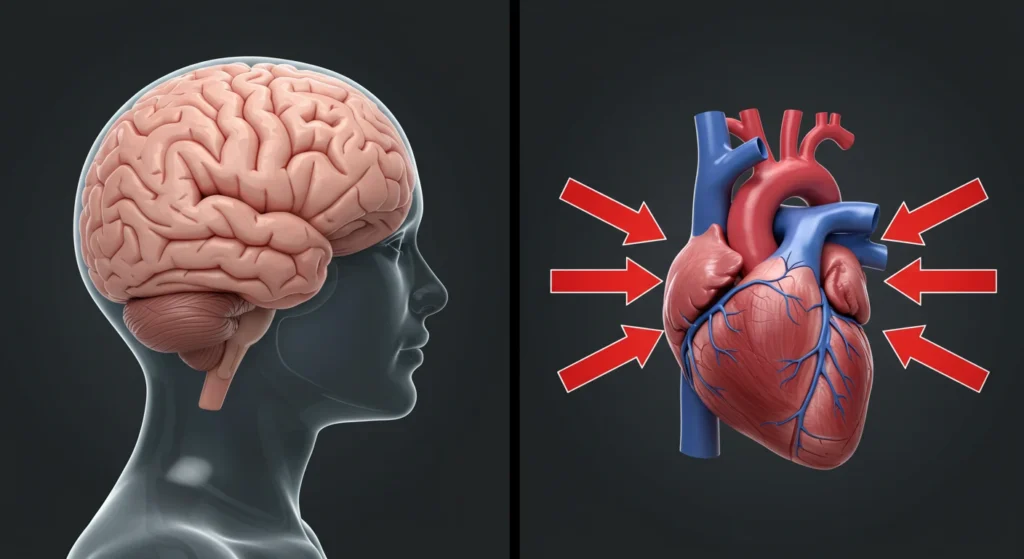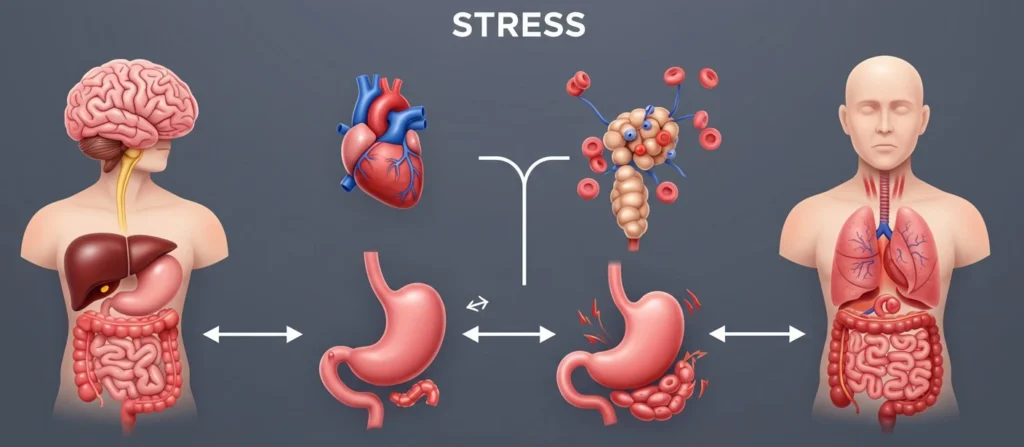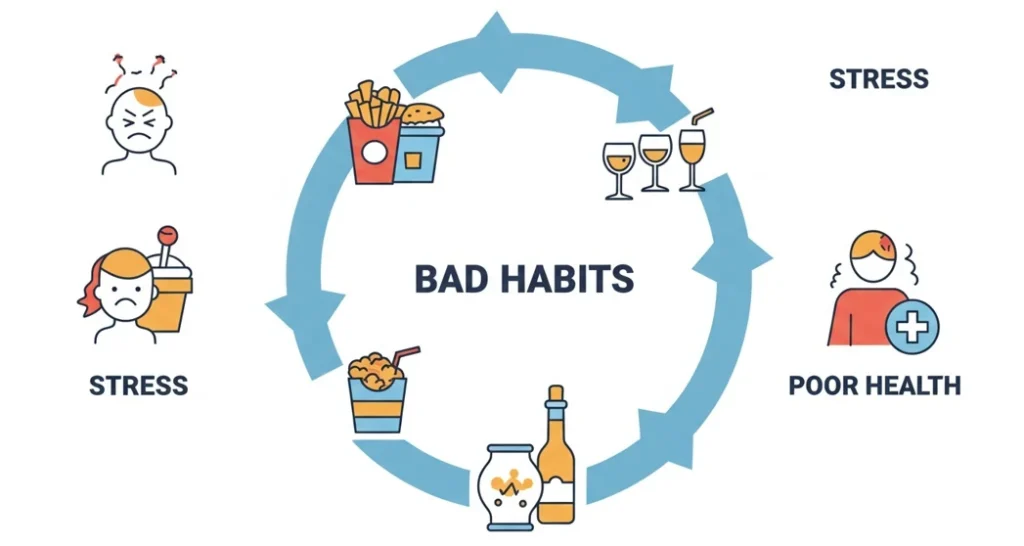Introduction
How stress affects your health is a crucial question in today’s fast-paced world. With the constant demands of work, relationships, and finances, stress can easily become overwhelming. Therefore, understanding its impact is essential for maintaining a healthy lifestyle. Not only does stress affect your emotional well-being, but it also directly influences your physical health. As a result, managing stress should be a top priority. Fortunately, there are proven strategies you can adopt to live healthier, feel better, and reclaim your peace of mind.
Understanding How Stress Affects Your Health: The First Step Toward a Healthy Lifestyle
Stress is more than just a passing feeling it plays a central role in shaping your lifestyle, your health, and even your future. To live a truly healthy lifestyle, understanding how stress functions within your body is absolutely essential. In today’s fast-paced world, where deadlines, financial pressures, and social expectations are constantly weighing on us, stress has become a daily companion for many. Therefore, recognizing how stress affects your health, body and learning how to manage it is the first step toward long-term wellness.

What Is Stress and How Stress Affects Your Health and Medicares Use
Stress is your body’s natural response to perceived danger or challenge. Whether it’s a looming deadline at work or a sudden emergency, your nervous system triggers the release of cortisol and adrenaline two powerful hormones that prepare you for immediate action. This biological reaction is commonly referred to as the “fight-or-flight” response.
Because your body believes it’s under threat, it directs energy to functions that will help you survive like increased heart rate, heightened awareness, and faster breathing while temporarily suppressing functions like digestion and immune response.
However, here’s where it becomes dangerous: even though this reaction was designed for short-term threats, modern life creates long-term stress, meaning your body remains in a hyper-alert state for extended periods. And that’s when health problems begin to emerge.
The Crucial Difference Between Acute and Health Consequences Of Chronic Stress for a Healthy Lifestyle
Acute Stress: A Short-Term Boost or a Warning Sign?
Acute stress is the immediate reaction to a specific threat. It might occur before a public speech, during a car accident, or in a heated argument. In short bursts, this kind of stress can actually be beneficial it sharpens your focus, energizes your body, and helps you perform under pressure.
Yet, too much acute stress especially if experienced frequently can still wear you down over time. That’s why identifying your stress triggers early is vital to protect both your mental and physical health.
Chronic Stress: The Silent Health Disruptor That Demands Your Attention
Chronic stress, on the other hand, is long-lasting and often harder to detect. It builds slowly, creeping into your daily routine as you juggle work responsibilities, family demands, financial obligations, and health issues. Over time, chronic stress disrupts nearly every system in your body.
Because your stress hormones remain elevated, your body never fully relaxes, which can lead to:
- Weakened immune system
- Sleep disturbances and fatigue
- High blood pressure and heart disease
- Digestive issues
- Mental health challenges such as anxiety and depression
In fact, long-term exposure to stress is now considered a key contributor to the rising need for medicares and mental health services across the globe.
How Understanding Stress Leads to a Healthier Lifestyle and Improved Well-Being
Taking time to understand your stress its triggers, its symptoms, and its effects empowers you to make intentional changes. These changes could include setting boundaries at work, developing a mindfulness practice, or incorporating physical activity into your daily routine.
Each of these strategies plays a role in lowering stress hormones and protecting your long-term health. Moreover, as you reduce chronic stress, you reduce your reliance on medicares, leading to a more sustainable and proactive approach to wellness.
How Stress Affects Your Health And Physically Your Body And Why Ignoring the Signs Damages Your Healthy Lifestyle
When it comes to building a healthy lifestyle, understanding how stress affects your health and physically your body is essential. While many people tend to associate stress with emotional or mental strain, the truth is that stress also leaves a profound physical impact on your body. From minor discomforts like muscle tension to life-threatening conditions like heart disease, stress plays a central role in compromising your overall health and increasing your dependence on medicares.

From Headaches to Heart Attacks – The Hidden Physical Toll of Chronic Stress on Your Health
Everyday Stress Symptoms You Should Never Overlook
Stress manifests in your body through a range of physical symptoms that, at first, might seem unrelated or harmless. However, when these signs occur frequently, they may indicate a much deeper problem that’s silently undermining your healthy lifestyle.
Here are some common physical symptoms of stress:
- Persistent headaches or migraines
- Tight or sore muscles, especially in the neck, shoulders, and back
- Fatigue or extreme tiredness, even after resting
- Digestive issues, such as bloating, nausea, or irritable bowel syndrome (IBS)
- Sleep disturbances, like insomnia or restless nights
- Chest pain or racing heartbeat
Moreover, stress suppresses your immune system, which makes you more susceptible to common colds, flu, and other infections. When your body is constantly flooded with stress hormones like cortisol, it becomes less effective at defending itself against pathogens.
Chronic Stress and Disease – The Silent Killer Behind Today’s Health Epidemics
Why Long-Term Stress is More Than Just “Feeling Overwhelmed”
While occasional stress is normal and even necessary, chronic stress is what truly wreaks havoc on your health. When stress affects your health and becomes a long-term condition lasting for weeks, months, or even years it transforms from a temporary response into a toxic influence that affects every system in your body.
Chronic stress has been linked to the development and progression of serious conditions such as:
- Heart disease
- Hypertension (high blood pressure)
- Type 2 diabetes
- Obesity
- Autoimmune disorders
- Inflammatory diseases
According to the American Psychological Association (APA), chronic stress plays a significant role in nearly every chronic illness affecting Americans today:
🩺 “Stress, especially chronic stress, has a major impact on physical health, contributing to the development and worsening of many diseases, including heart disease and diabetes,” — American Psychological Association (source).
The Link Between Stress, Medicares, and Long-Term Health Dependency
As chronic stress persists, many people find themselves relying heavily on medicares, medications, and clinical interventions to manage symptoms that could have been prevented through early stress management. Unfortunately, this reactive approach leads to higher healthcare costs and a lower quality of life.
Instead, the goal of a truly healthy lifestyle is to take a proactive stance learning to identify the sources of stress, adopting habits that reduce stress levels, and nurturing your physical and mental well-being before medical intervention becomes necessary.
Emotional and Mental Consequences of Stress and How It Rewires the Brain: The Hidden Danger to Your Healthy Lifestyle
When building a truly healthy lifestyle, it’s not enough to care for your physical health you must also protect your emotional and mental well-being. One of the most underestimated aspects of modern life is how stress can completely alter the way your brain functions. While the physical effects are often more visible, the mental health consequences can be even more damaging, especially when ignored over time. If you want to preserve your long-term health, understanding how chronic stress rewires the brain is a critical step.

How Stress Affects your Health Disrupting Brain Chemistry and Threatens Mental Health
The Chemical Imbalance: Why You Feel Anxious, Irritable, or Depressed
Stress doesn’t just affect your muscles or immune system it affects your neurochemistry, altering how your brain processes emotion, memory, and motivation. When you experience long-term stress, your body produces excess cortisol. While cortisol helps you deal with short-term threats, constant exposure reduces important neurotransmitters like dopamine and serotonin—chemicals responsible for feelings of pleasure, calm, and happiness.
As a result, you may begin to feel:
- Chronic anxiety and restlessness
- Persistent irritability or sudden mood swings
- Depressive thoughts, lack of motivation, or hopelessness
- Brain fog and difficulty concentrating
- Emotional numbness or disconnection from others
These symptoms are more than just emotional fluctuations they are direct consequences of stress-related changes in brain chemistry.
🧠 “Chronic stress can lead to long-term changes in the brain’s structure and function, especially in areas involved in emotion regulation and memory,” says Dr. Bruce McEwen, a neuroendocrinologist at The Rockefeller University (source).
Burnout, Anxiety, and Depression: The Mental Price Of Health Consequences Of Chronic stress in Today’s Lifestyle
Burnout Isn’t Just Exhaustion It’s Mental Collapse from Unchecked Stress
One of the most severe consequences of unmanaged stress is burnout a state of physical, emotional, and mental exhaustion caused by prolonged and excessive pressure. Burnout often shows up as:
- Emotional detachment from work or relationships
- Loss of enthusiasm or drive
- Increased cynicism or negativity
- A deep sense of failure or helplessness
Unfortunately, many individuals try to “push through” these feelings, believing they are just part of the grind. But ignoring these red flags only worsens the damage to your health and can result in reliance on medicares to cope.
From Stress to Suicidal Thoughts – Why Mental Health Matters in a Healthy Lifestyle
If stress affects your health continuously and go unmanaged, it may escalate into serious mental health conditions such as clinical depression, generalized anxiety disorder, or even suicidal ideation. These are not rare outcomes they are alarmingly common in high-pressure environments and must be taken seriously.
This is especially critical considering that many individuals suffering from chronic stress delay seeking help sometimes until it’s too late. Creating a healthy lifestyle means recognizing the mental signs early and seeking support, whether through therapy, support groups, or professional medical care.
The Vicious Cycle of Stress: How It Fuels Lifestyle Diseases and Destroys Your Healthy Habits
When you’re trying to live a healthy lifestyle, understanding the hidden ways stress sabotages your health is crucial. Unfortunately, stress doesn’t just make you feel overwhelmed it actively contributes to the development of lifestyle diseases and pushes you toward bad habits that reinforce the cycle. This loop between emotional tension, harmful behaviors, and declining health is incredibly destructive and, if left unaddressed, can lead to a lifelong dependency on medicares.

But here’s the good news: you can break this vicious cycle. And it starts by recognizing how stress affects your health, feeds disease and steals control over your choices.
Unhealthy Coping Mechanisms That Worsen Stress and Destroy Your Health
How Emotional Stress Fuels Harmful Habits Like Overeating, Smoking, and Drinking
One of the most dangerous aspects of chronic stress is how it alters your behavior often in ways that seem comforting in the moment but are deeply harmful in the long term. When you’re under stress, your brain craves quick relief. As a result, many people turn to coping mechanisms that offer short-term comfort but long-term damage.
These may include:
- Overeating, especially high-sugar and high-fat comfort foods
- Smoking or vaping to “calm the nerves”
- Excessive alcohol consumption to numb emotions
- Avoiding physical activity, choosing screen time instead
- Poor sleep hygiene, staying up late to “escape” the stress
These habits compound over time, leading to weight gain, sleep disorders, and a decline in mental and physical health. Even worse, they perpetuate more stress, creating a loop that’s hard to escape.
How Stress Affects Your Health And Directly Contributes to Chronic Illness and Lifestyle Diseases
Why Ignoring the Stress-Disease Link Can Cost You Your Long-Term Health
Stress triggers inflammation in the body, increases blood pressure, elevates blood sugar levels, and disrupts hormonal balance. Over time, this physiological chaos contributes to major lifestyle diseases, including:
- Obesity – driven by emotional eating and disrupted metabolism
- Heart disease – linked to high blood pressure and arterial damage
- Type 2 diabetes – exacerbated by cortisol-induced insulin resistance
- Gastrointestinal disorders – such as ulcers or irritable bowel syndrome
- Certain cancers – with stress-linked behaviors increasing the risk
This is the real cost of unmanaged stress: a life dependent on medicares, frequent doctor visits, and medications just to maintain basic health.
Healthy Lifestyle Habits That Break the Stress-Disease Connection for Good
Your Daily Actions Can Protect You from the Silent Damage of Stress
The best way to protect your health from stress-induced disease is to build a lifestyle that supports resilience and recovery. This means making conscious daily choices that nourish your body and calm your mind. Here’s how:
- Engage in regular physical activity (30 minutes a day can reduce cortisol)
- Eat a balanced diet rich in fiber, protein, and micronutrients
- Prioritize quality sleep, aiming for 7–9 hours per night
- Practice stress-reducing techniques like meditation, breathwork, or yoga
- Limit stimulants like caffeine and reduce alcohol intake
By committing to these healthy choices, you can reverse the damage stress has done, reduce your reliance on medicares, and build a sustainable, balanced life.
Proven Natural Strategies for Managing Stress and Promoting a Healthier Lifestyle Without Relying on Medicares
In today’s fast-paced world, managing stress is no longer optional it’s essential for maintaining your health and building a sustainable healthy lifestyle. While many people immediately turn to medicares or prescriptions for relief, there are several proven natural strategies that work just as effectively often without side effects. These holistic methods don’t just reduce stress; they improve overall well-being, enhancing both mental and physical health.

Relaxation Techniques That Calm the Mind and Balance the Body Naturally
Deep Breathing, Yoga, and More – The Science Behind Natural Stress Relief
One of the best parts about managing stress naturally is how accessible and effective these tools can be. You don’t need a prescription—you need consistency, awareness, and a commitment to your lifestyle. Here are a few powerful, science-backed techniques that help regulate your nervous system and restore calm:
- Deep Breathing: Controlled breathing activates the parasympathetic nervous system, which signals your body to relax. Just five minutes of deep breathing can reduce heart rate, lower blood pressure, and promote clarity of thought.
- Yoga: This ancient practice combines movement, breathwork, and mindfulness. According to the National Institutes of Health, yoga significantly lowers cortisol levels and improves stress resilience (NIH Source).
- Progressive Muscle Relaxation (PMR): PMR involves tensing and then slowly relaxing each muscle group. This technique helps people release tension they didn’t even realize they were holding.
- Guided Meditation and Visualization: Using apps or videos, you can follow audio guidance to calm your thoughts and visualize peaceful settings. This simple technique reduces the mental chatter associated with chronic stress.
Lifestyle Enhancements That Promote a Healthy, Stress-Resilient Body
Nutrition, Sleep, and Movement: The Forgotten Natural Medicines
Beyond relaxation practices, your daily choices play a key role in determining how your body handles stress. Making small but consistent changes to your lifestyle can dramatically increase your ability to bounce back from emotional and physical strain.
- Eat Nutrient-Dense Foods: A diet rich in whole foods, healthy fats, lean proteins, and colorful vegetables provides the nutrients your brain needs to produce serotonin and dopamine two essential “feel good” chemicals.
- Stay Hydrated: Dehydration can increase anxiety and fatigue. Drinking enough water supports every physiological function involved in stress recovery.
- Prioritize Sleep: Chronic sleep deprivation heightens stress and weakens your immune system. Aim for 7–9 hours of sleep, and establish a calming pre-bed routine to improve sleep quality.
- Move Your Body Daily: Even a 20-minute walk increases endorphins and lowers cortisol. Movement doesn’t need to be intense to be effective—it just needs to be consistent.
The Holistic Benefits of Natural Stress Relief: Healing Without Medicares
Why Natural Approaches Work Long-Term for Sustainable Health
While medicares can offer temporary relief, they often address symptoms rather than root causes. Natural methods, by contrast, help retrain your nervous system, balance your hormones, and rebuild resilience from within. They are free from side effects, empower you to take control, and integrate seamlessly into your healthy lifestyle.
Moreover, these techniques promote self-awareness, emotional regulation, and long-term behavioral change key elements for maintaining balance in a world full of demands.
Building Long-Term Resilience with Healthy Habits That Protect Against Stress Affects Your health and Minimize Medicares Dependence
In today’s modern world, developing resilience against stress is more important than ever for protecting your health and sustaining a healthy lifestyle. Instead of relying solely on medicares and quick pharmaceutical fixes, focusing on long-term, daily habits can provide lasting benefits for both your body and mind. These simple rituals may appear small, but their cumulative power can transform your physical and emotional well-being making you less reactive to life’s daily stressors.

Simple Daily Rituals That Boost Mood, Support Immunity, and Reduce Stress Naturally
How Nature, Gratitude, and Music Lower Cortisol and Build Mental Strength
Building resilience isn’t about having superhuman strength it’s about incorporating simple yet powerful habits into your day. These practices regulate your nervous system, elevate your mood, and reduce the body’s physiological stress response.
Here are a few impactful rituals to consider:
- Spending Time in Nature: Just 20 minutes outdoors can significantly reduce cortisol levels and improve mental clarity. Natural light also helps regulate circadian rhythms and boost vitamin D.
- Listening to Music: Calming music lowers heart rate and blood pressure. According to the Mayo Clinic, music therapy can be an effective tool to reduce stress, anxiety, and even chronic pain (Mayo Clinic Source).
- Practicing Gratitude: Writing down three things you’re grateful for each day creates a positive shift in mindset. Gratitude has been scientifically shown to improve sleep, reduce inflammation, and boost serotonin production.
- Digital Detoxing: Unplugging for a few hours each day improves focus, reduces information overload, and allows your nervous system to reset.
- Mindful Moments: Whether it’s sipping tea slowly or simply observing your breathing, short moments of mindfulness throughout the day can dramatically increase your ability to cope with stress.
These rituals are easy to implement and cost nothing yet they build emotional resilience and significantly reduce your reliance on medicares.
The Role of Food and Fitness in Building Resilience and Enhancing Health
How Nutrition and Movement Train Your Body to Resist Stress and Stay Strong
In addition to emotional rituals, healthy lifestyle choices like what you eat and how you move play a massive role in stress regulation and overall health.
- Eat for Stress Resilience: Focus on whole, nutrient-dense foods like leafy greens, fatty fish, nuts, and berries. These are rich in magnesium, omega-3s, and antioxidants all crucial for supporting the adrenal system and reducing inflammation.
- Limit Sugar and Caffeine: These stimulants spike your cortisol and can lead to mood crashes and poor sleep. Replace sugary drinks with herbal teas and stay hydrated throughout the day.
- Move Your Body Intentionally: Exercise increases the production of endorphins, which are natural mood elevators. You don’t need a gym brisk walking, dancing, or stretching are enough to make a difference.
- Strength Training and Yoga: These forms of movement not only tone the body but improve hormonal balance and increase physical endurance making it easier for your body to handle stress.
Small Habits, Big Impact: How to Sustain Healthy Changes That Stick
Daily Commitment to Self-Care Builds Lasting Protection Against Stress
Resilience doesn’t come from doing something once it comes from doing the right things consistently. By making small, manageable adjustments to your lifestyle, you protect your long-term health and reduce dependence on costly medicares. Here are ways to stay consistent:
- Set realistic micro-goals (e.g., 10-minute walk, 1 glass of water per hour)
- Track your habits using a journal or app
- Celebrate small wins to stay motivated
- Surround yourself with supportive people who share healthy values
- Reflect weekly on what works and what doesn’t
Over time, these small steps evolve into a strong personal foundation keeping you grounded and healthy, no matter what life throws at you.
When Stress Becomes Too Much: Recognizing the Need for Professional Help in Your Healthy Lifestyle Journey
There comes a point in everyone’s lifestyle when stress begins to take over affecting your physical health, emotional stability, and overall well-being. Even though natural coping strategies and healthy habits are incredibly effective, there are times when they are not enough. At such moments, knowing when and how to seek professional help becomes crucial not only for your peace of mind but also for preventing dependence on medicares.

Red Flags You Shouldn’t Ignore: When Stress Crosses the Line Into Danger
Key Signs Your Body and Mind Are Asking for Immediate Support
Understanding the early warning signs of overwhelming stress is essential in protecting your mental and physical health. Here are several red flags that indicate professional intervention is necessary:
- Persistent Anxiety or Panic Attacks: If you constantly feel on edge or experience episodes of intense fear, this could signal an anxiety disorder.
- Physical Symptoms That Won’t Go Away: Frequent headaches, digestive issues, chest pain, or insomnia are all physical manifestations of chronic stress.
- Emotional Exhaustion and Irritability: If you’re losing interest in things you once enjoyed or snapping at loved ones without reason, it might be more than just a bad day.
- Isolation and Withdrawal: Pulling away from friends, family, or social situations is a classic sign of deteriorating mental health.
- Reliance on Unhealthy Coping Mechanisms: Increasing use of alcohol, drugs, or binge eating is a strong indicator of unmanaged stress.
If any of these apply to you, it’s time to recognize that self-help strategies may no longer suffice and that’s perfectly okay. In fact, seeking help is a healthy decision that reflects strength and self-awareness.
From Therapy to Coaching – Professional Paths That Support a Balanced, Healthy Lifestyle
Why You Don’t Have to Face Stress Alone
Luckily, there are many evidence-based and holistic options available to support you. Today’s mental health services are more accessible, personalized, and effective than ever.
- Cognitive Behavioral Therapy (CBT): CBT is one of the most researched treatments for managing stress, anxiety, and depression. It helps reframe negative thought patterns and replace them with healthier responses.
- Holistic Health Practitioners: Professionals such as naturopaths and integrative therapists may offer support that blends nutritional guidance, mindfulness techniques, and natural remedies—helping you reduce reliance on medicares while restoring your health.
- Health and Wellness Coaching: These professionals provide accountability and personalized lifestyle strategies to manage stress, improve healthy habits, and create a sustainable lifestyle.
- Support Groups: Whether in-person or online, connecting with others who are going through similar challenges can offer comfort, perspective, and encouragement.
🧠 “Ignoring chronic stress symptoms can lead to serious physical and psychological damage. Seeking help early often prevents the progression into more complex disorders.”
— Dr. Nadine Kaslow, Professor of Psychiatry, Emory University
Source: American Psychological Association
Navigating the Medicares Dilemma: Why Seeking Help Doesn’t Always Mean Medication
Exploring Non-Pharmaceutical Support That Aligns With Your Healthy Lifestyle Goals
While medicares are often seen as the default solution, they’re not the only option—and often, they’re not the best long-term answer. Many people find relief through therapy, nutrition, movement, and stress management techniques, reducing or avoiding medication altogether. However, in some cases, short-term medication may be necessary and there is no shame in that. The key is a personalized approach that fits your needs and supports your health holistically.
Your Next Step: Making the Call That Changes Everything
Taking that first step toward seeking help might feel intimidating, but it could be the most powerful decision you make for your health. Whether you choose a licensed therapist, a coach, or a holistic health professional, what matters most is that you choose to prioritize yourself.
Your healthy lifestyle begins with action and that action starts with asking for help when it’s truly needed.
Your Stress-Free Future Starts Now: Empowering Final Thoughts for a Healthy Lifestyle
In today’s fast-paced world, stress has become an unavoidable part of modern life. But understanding how stress affects your health and knowing what you can do about it is the first powerful step toward reclaiming balance. From this moment on, you have the ability to create a healthy lifestyle rooted in both physical and mental well-being. Yes, your stress-free future starts now, and it begins with informed choices, consistent habits, and the courage to act.

Commit to a Health-First Lifestyle: The True Key to Long-Term Wellness
Why Prioritizing Your Health Is the Most Important Decision You’ll Ever Make
Let’s be honest: no pill, crash diet, or temporary fix will lead to sustained wellness. Instead, it’s the daily commitment to healthy routines that builds lifelong resilience. And although the process may feel overwhelming, it truly begins with small steps that compound over time.
For example, choosing to wake up 15 minutes earlier for meditation, swapping fast food for home-cooked meals, or walking instead of driving short distances these decisions may seem minor, but they yield tremendous health benefits. Not only do they improve your physical stamina, but they also rewire your brain for clarity, joy, and resilience.
Small Daily Choices That Lead to Big, Long-Term Health Benefits
From Micro-Habits to Massive Change – Why Consistency Matters More Than Perfection
Every healthy choice you make strengthens your foundation for mental and physical wellness. Over time, these choices accumulate, rewiring both your body and your brain for better performance and greater peace of mind.
Here are examples of small shifts that build a healthy lifestyle:
- Start your day with gratitude journaling, which helps reduce morning anxiety.
- Drink more water to prevent dehydration-related fatigue and tension.
- Take screen breaks every 90 minutes, which boosts focus and reduces eye strain.
- Go to bed 30 minutes earlier, allowing your brain to recover and reset overnight.
- Replace one sugary snack with a whole food alternative, which supports gut health and reduces inflammation.
While each of these might seem insignificant, combined they create a lifestyle that is naturally resistant to health consequences of chronic stress and far less reliant on medicares or crisis intervention later.
Your Action Plan Starts Today: Make a Commitment to Your Well-Being
You Are the Author of Your Lifestyle Story – Write It With Intention
Let’s be clear living a healthy lifestyle isn’t about being perfect. It’s about being intentional. It’s about waking up each day with the decision to put your health first, even when life gets complicated. And although stress affects your health it will always exist, your response to it can evolve. That evolution starts now.
So whether you choose to:
- Start a 5-minute mindfulness practice,
- Prep healthy meals for the week,
- Book a session with a wellness coach, or
- Simply go for a walk in nature…
…each of these steps brings you closer to a life with less stress, more energy, and true vitality.
Say Goodbye to Stress and Hello to a Healthier You
Your stress-free future is not a fantasy it’s a reachable, realistic outcome built by consistent action. And the best part? You’re not alone. You have tools, knowledge, and support available at your fingertips. Now it’s your turn to take that first step.
👉 Transform your routine, reclaim your calm, and live the life you deserve. Start now.






